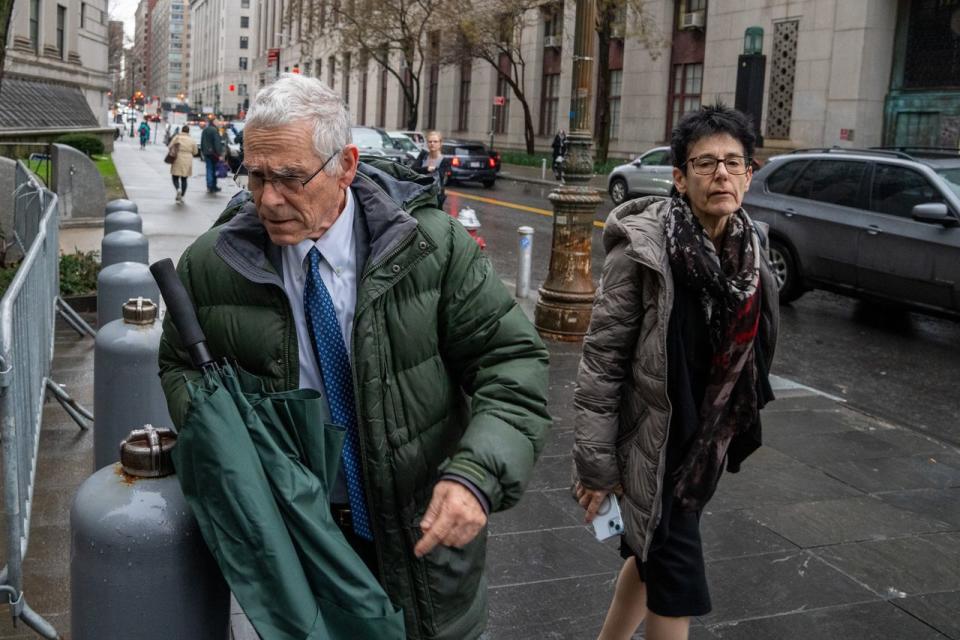FTX Founder Sam Bankman-Fried Sentenced to 25 Years
FTX founder Sam Bankman-Fried was sentenced Thursday to 25 years in prison for what prosecutors called one of the largest financial frauds in U.S. history, capping the onetime crypto king’s meteoric rise and fall.
Most Read from The Wall Street Journal
How the Atlantic Went From Broke to Profitable in Three Years
Bonds Got Relabeled. Now Millions of Americans Get Higher Electric Bills.
Where Are This Year’s Tax Refunds Going? Right Into a Debt Hole.
Home Depot Buys Roofing Distributor in Deal Valued at $18 Billion Including Debt
Less than two years ago, the moptop millennial hobnobbed with heads of state, soaked up Caribbean views from his $30 million penthouse and vowed to use his wealth to better humanity.
A jury last year found the 32-year-old guilty of stealing billions of dollars from FTX customers and defrauding investors and lenders to his crypto investment firm Alameda Research.
U.S. District Judge Lewis Kaplan said that in determining the sentence he weighed the brazenness of Bankman-Fried’s actions, his lack of remorse and the possibility he’d commit future crimes. “There is a risk that this man will be in a position to do something very bad in the future,” Kaplan said. “And it’s not a trivial risk at all.”
The judge said Bankman-Fried owes $11 billion in financial penalties, ordering the government to use properties and assets seized from Bankman-Fried to compensate victims.
Bankman-Fried stood stoically as Kaplan handed down the sentence. His mother, grimacing, looked out a courtroom window while his father put his head down in his hands.
Before he was sentenced, Bankman-Fried told the judge that he was haunted every day by what he had thrown away.
“I’m sorry about what happened at every stage,” the FTX founder, who wore tan jail garb, said during his 20-minute statement. “At the end of the day, I failed everyone I cared about.”
Federal prosecutors say Bankman-Fried used other people’s money to fund his lavish lifestyle, make risky investments and pursue his political agenda.
At the peak of his influence, Bankman-Fried was a prominent voice for bringing greater regulation to crypto and vowed to use his wealth to benefit society. FTX’s shocking downfall hardened the attitudes of politicians in Washington toward crypto and contributed to a lengthy slump in the price of bitcoin and other digital currencies.
Prosecutors had asked Kaplan to sentence Bankman-Fried to 40 to 50 years in prison.
While Bankman-Fried said he made mistakes, he didn’t acknowledge committing crimes, Assistant U.S. Attorney Nicolas Roos told the court. “What we did not hear is accepting responsibility for lying, for stealing and for fraud,” said Roos.
Bankman-Fried’s lawyers, however, had said a sentence of no more than six years in prison was more appropriate, arguing that he still had much to offer to society. They pointed to his charitable works, his deep remorse and his autism as reasons for a lenient sentence.
Marc Mukasey, his lawyer, told the judge that Bankman-Fried wasn’t a “ruthless financial serial killer” who sought to hurt people.
“Sam Bankman-Fried does not make decisions with malice in his heart,” Mukasey said. “He makes decisions with math in his head.” His lawyers plan to appeal.
Kaplan asked that federal prison officials assign Bankman-Fried to a medium- or low-security facility, ideally near his parents in the San Francisco Bay Area. In making the recommendation, the judge cited Bankman-Fried’s low risk for violence and noted that his autism and association with wealth make him a target for other prisoners.
Bankman-Fried is unlikely to serve the full term, due to credits, including for good behavior, that can shave off roughly a third of a defendant’s sentence, prison consultants said.
Bankman-Fried, the son of Stanford Law School professors started FTX in 2019 with a fellow Massachusetts Institute of Technology graduate. The company had a quick takeoff, riding a tide of growing popularity in crypto trading.
Millions of customers joined his exchange, drawn to Bankman-Fried’s image as a shaggy-haired genius and to FTX commercials starring NFL star Tom Brady and comedian Larry David. As the exchange soared in value, Bankman-Fried crisscrossed the globe on private jets and hosted dinners with guests such as Bill Clinton and Tony Blair.

That world came crashing down in early November 2022 after the crypto website CoinDesk published what purported to be a leaked Alameda balance sheet, causing a run on FTX customer funds. Soon after, the exchange filed for bankruptcy protection. The Manhattan U.S. attorney’s office charged Bankman-Fried a month later.
During a monthlong trial in the fall, jurors heard testimony from three of Bankman-Fried’s top lieutenants, including his ex-girlfriend, who said the FTX founder directed them to commit crimes alongside him. Bankman-Fried took the unusual step of testifying in his own defense. He told jurors that he never committed fraud, yet he struggled under cross examination, saying dozens of times that he didn’t recall specifics.
Kaplan said Thursday that Bankman-Fried committed perjury during his testimony, including when he told jurors that until fall 2022, he had no knowledge that Alameda had spent FTX customer deposits.
In the weeks before the sentencing, Bankman-Fried’s supporters wrote letters to the judge, saying that his struggles with depression, autism and anhedonia—the inability to feel happiness—weigh in favor of a lighter sentence.
Bankman-Fried’s mother, Barbara Fried, said in her letter to Kaplan that her son had sought to do good in the world from a young age. When he was 4 years old, she said, he tried to help a fallen toddler. He was precocious as well, she said, independently reading complex moral and philosophical literature in middle school. In high school, he counseled classmates who were depressed, despite battling depression himself, she said.

“But this is not just a personal tragedy,” she wrote to the judge. “The ease with which we consign young lives with so much promise to the trash heap is a societal tragedy as well.”
Josh Naftalis, a former federal prosecutor, said that Kaplan imposed a significant but fair sentence. “The court clearly wanted to send a message to the crypto market generally, and it indicated that it considered the possibility that Bankman-Fried would reoffend,” he said. “That is significant because white-collar defendants generally have low recidivism rates.”
Prosecutors said Bankman-Fried’s fraud amounted to $10 billion in losses, placing him alongside the country’s most notorious white-collar criminals. They likened him to Bernie Madoff, the Manhattan financier who orchestrated a Ponzi scheme that led to $13 billion in losses. Madoff received a sentence of 150 years and died in prison at 82 in 2021.
Crypto investor Julian Figueroa said he thought Bankman-Fried’s sentence was light for his crimes. The 28-year-old, who lives in Vancouver, British Columbia, said he lost a year’s salary from the FTX collapse.
“Bernie Madoff got much more, so I don’t quite understand why Bernie Madoff would get more time than Sam Bankman-Fried, all things considered,” he said.
Other high-profile, white collar criminals have received shorter sentences. For instance, Theranos founder Elizabeth Holmes was sentenced to about 11 years in 2022 for running a yearslong fraud and former Enron chief Jeffrey Skilling received a sentence of 14 years for lying to investors about the firm’s financial health.
Current FTX Chief Executive John Ray said in a filing to the judge that customers are expected to be repaid the value of their claim on the date the exchange filed for bankruptcy protection. However, many cryptocurrencies have surged in value since that time, meaning customers will miss out on the financial gain, he said.
Kaplan said Thursday that in determining the sentence, he wasn’t weighing whether customers would get their money back.
“A thief who takes his loot to Las Vegas and successfully bets the stolen money is not entitled to a discount on the sentence,” the judge said.
Write to James Fanelli at james.fanelli@wsj.com and Corinne Ramey at corinne.ramey@wsj.com
